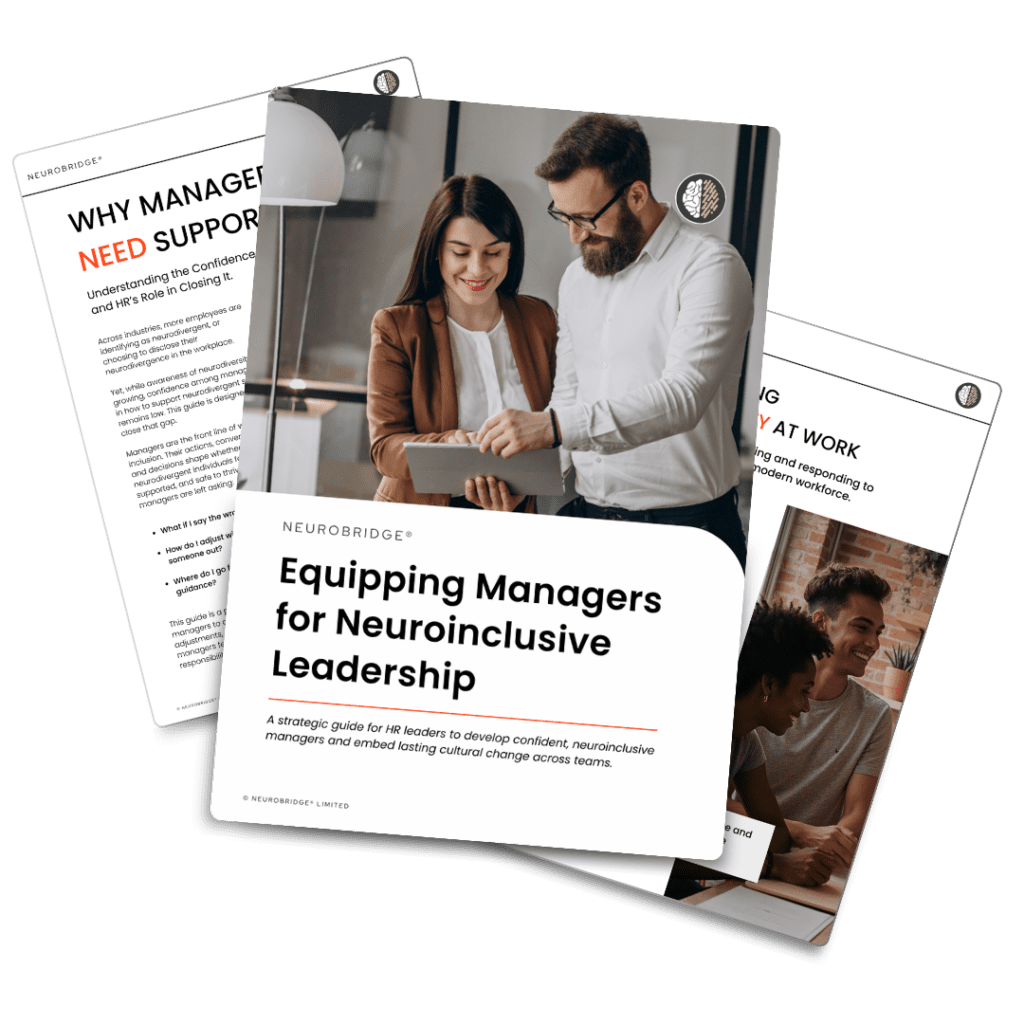Most line managers genuinely care about their people.
They want to foster psychologically safe, inclusive teams. They want to get it right. But when it comes to managers supporting neurodivergent employees, many are left quietly unsure:
What if i say the wrong thing?
What if I don’t know someone is neurodivergent?
How do I support someone without making them uncomfortable?
This is the manager’s dilemma.
The desire to help, met with a fear of doing harm. And without clear guidance, many default to doing nothing – not out of apathy, but out of uncertainty.
27%
of employers say there’s training for managers on what neurodiversity is.
18%
of employers say there’s training for line managers in when a job applicant or employee tells them they are neurodivergent.
24%
of employers say there’s training on how to support neurodivergent team members
The Gap Between Intention and Action
Many organisations have neurodiversity awareness programmes. But awareness isn’t the same as capability.
Line managers are often:
Unsure What Signs to Look For
Line managers are frequently unsure what signs to look for when someone is struggling. Subtle signs of burnout, masking, or sensory overwhelm can go unnoticed without a basic understanding of neurodivergence.
Afraid to Initiate Sensitive Conversations
Even when a manager suspects a team member may need support, they’re often afraid to initiate a conversation in case it causes discomfort or oversteps boundaries.
Unclear Where Their Responsibility Starts and Ends
Are they meant to wait for HR? Are informal adjustments even allowed?
Not Comfortable Making Informal Adjustments
Many managers lack the knowledge, tools, and confidence to make informed decisions or implement informal adjustments, leaving neurodivergent employees without the tailored support they need to thrive.
Without structured support or guidance, supporting neurodivergent employees as a manager can feel overwhelming, even for the most compassionate leaders.
The result? Neurodivergent employees can end up unsupported, not because their managers lack compassion, but because the system assumes they’ll just figure it out on their own. That’s why awareness must be paired with neurodiversity training specific for managers, closing the gap between intention and action.

Why It Matters
Managers are the frontline of inclusion. Their daily decisions shape whether neurodivergent individuals stay or leave, disclose or stay silent, and ultimately whether they thrive or burn out.
When managers aren’t confident in supporting neurodivergent employees, the consequences ripple out. High-potential neurodivergent talent may exit quietly. Misunderstandings become grievances. Employee engagement surveys might look fine on the surface but mask deeper issues around belonging and psychological safety. Over time, the trust gap between a company’s stated intentions and lived experience widens—and that’s a cultural cost no organisation can afford.
When managers lack tools and confidence in supporting neurodivergent employees, the consequences show up in:
– Attrition of high-potential talent
– Grievances and misunderstandings
– Engagement scores that mask deeper cultural issues
– A widening trust gap between intent and experience
Investing in manager neurodiversity support training doesn’t just prevent problems—it protects retention, reputation, and team wellbeing.
What Managers Actually Need
The good news? Managers don’t need to become experts in neurodiversity. They need practical tools, consistent support, and the confidence to lead inclusively.
Clear guidance on how to create safe, inclusive team environments.
Simple frameworks that show how to create psychologically safe team environments, where neurodivergent individuals feel seen and supported.
Confidence to navigate support conversations without relying on diagnosis or disclosure.
Often, neurodivergent employees won’t share their diagnosis at work, so managers must feel equipped to act on observed needs and behaviours, not labels.
Tools to adjust workloads, expectations, and communication styles
Something as small as offering written follow-ups or allowing flexible scheduling can make a significant difference.
Clarity on policies and where to escalate for support
Managers need to understand their role in creating inclusive culture, not perfection, just proactive and consistent action.
And most importantly, they need to know that supporting neurodivergent employees as a manager isn’t about being perfect, it’s about being proactive, human, and consistent.
That’s why neurodiversity training for managers should be ongoing, embedded into manager development, and immediately applicable.
The Role of the Organisation
Let’s be clear: a lack of manager capability is not a personal failing. It’s an organisational design issue.
Leading organisations are shifting away from one-off training towards embedded, ongoing development. They’re weaving neuroinclusive leadership into manager training programmes from day one. They’re creating ready-to-use playbooks, decision trees, and scenario-based support that managers can turn to in real time. Instead of relying on memory, they’re introducing ongoing nudges and check-ins that keep inclusion top of mind. And they’re ensuring legal, ethical, and cultural expectations are not just understood, but operationalised.
When this support is in place, managers move from passive to proactive. From nervous to capable. From well-meaning to well-equipped.

How NeuroBridge® Helps Managers Lead Inclusively
At NeuroBridge, we move beyond awareness to build real capability. Our platform is designed to empower managers with the exact tools they need to support neurodivergent employees effectively. Our platform supports managers with:
Playbooks tailored to real workplace situations
1:1 frameworks that reduce reliance on disclosure
Team communication toolkits that build trust
On-demand access to support, advice, and shared learning
We don’t expect managers to be neurodiversity experts. But we can give them the tools to be effective, consistent, and human in supporting neurodivergent employees as a manager.
NEUROBRIDGE® GUIDE
How to Develop Inclusive Managers Across Your Organisation
We’ve created a strategic guide to help HR leaders equip their managers with the confidence, language, and practical tools to lead neuroinclusive teams — now and in the future. This guide unpacks:
- Why developing inclusive managers is essential for neurodivergent inclusion
- The hidden barriers that stop managers from taking confident action
- What HR can do to close the confidence gap and embed inclusive behaviours
- Practical tools, tips, and training approaches to build manager capability
Fill in the form below to receive your copy by email.

Start Developing Inclusive Managers Across Your Organisation.



